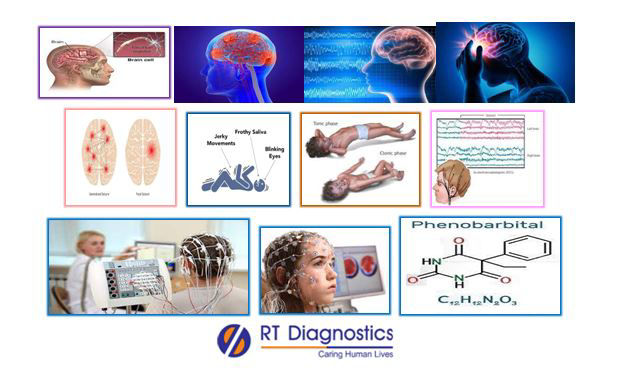Gardenal (Phenobarbitone)
Phenobarbital is one of the therapeutic medications for epilepsy (to regulate the brain’s exaggerated electrical activity, since the medicine has a hypotonic property – to slow down the activity of the brain). Hence this test measures the Phenobarbital levels in the blood, to avoid side effects due to overdose (to prevent controlling the higher dose administration crossing the therapeutic levels).
Gardenal (Phenobarbital):
Why Gardenal (Phenobarbital) Test ?
CLINICAL INFORMATION
Seizure is also often interchangeably known as convulsions (or also commonly referred to as fits). Any factor that interrupts the normal (mechanical or functional) nerve cell communication between nerve cells in the brain can induce a seizure. A seizure is a sudden, uncontrolled electric impulse discharged (due to disturbance) in the brain. When a person has two or more seizures with unknown causes is diagnosed with epilepsy. It can cause changes in the behaviour, movements or feelings and in the levels of one’s consciousness in an epileptic patient during an episode. During a convulsion, a person has uncontrollable shaking (rapid and rhythmic) movements by muscles contracting and relaxing repeatedly. There are different types of generalized seizures classified as absence seizures (formerly known as petit mal), tonic-clonic or convulsive seizures (formerly known as grand mal), atonic seizures (called drop attacks), clonic seizures, tonic seizures, myoclonal seizures etc. Some of the causes of epilepsy include high fever, high or low blood sugar, alcohol, drug withdrawal, brain concussion etc. Phenobarbital is also known as phenobarbitone (also referred to as 5-ethyl 5-phenylbarbituric acid). Phenobarbital (a prescription medicine) belongs to a class of drugs called anticonvulsants. It is used to treat and prevent the symptoms of seizures, insomnia, sedation, hypnotics Status Epilepticus etc. Gardenal (a generic name is Phenobarbital) belongs to the class of medicines known as bariturates, which helps to treat and prevent epilepsy (seizures). The hypotonic property of therapeutic medicine - Gardenal allows to facilitate and calm down the brain’s exaggerated electrical activity and thus helps sedate an epileptic patient. Other uses of phenobarbital include relieving anxiety etc. Its side effects include dizziness, drowsiness, excitation, tiredness, loss of appetite, nausea, vomiting may occur in the due course to adapt physiologically to this medication in epileptic patients. The other drawback of this medication is its withdrawal symptoms (i.e patients who become addicted and develop cravings due to its dependence on medication). Long term use may cause hyperactivity, behavioural problems, sedation, dementia etc. Phenobarbitone assay is used to measure the levels of phenobarbitone in the blood (since it has a narrow therapeutic index). This test evaluates to monitor the levels of phenobarbital for prognosis (to ensure the therapeutic levels to avoid its toxic side effects). Other additional tests include electroencephalogram – detects tiny electrical discharge that results from the activity of brain cells (to detect abnormalities in brain wave pattern or in the electrical activity of the brain) etc.

General Instructions:
Sample Requirement: Specimen - Blood sample collected from the vein. Test Preparation: None.
NOTE - Sample for specimen collections may vary based on the patient’s condition/cases according to the patient’s presenting complaints/signs or symptoms:
SPECIMEN REQUIREMENT (Special or Rare Cases) - As instructed and guided by Physician / Clinician / Pathologist / as per Laboratory’s requirements, according to procedures and protocols.
This Multi-Specialty Clinical Referral Laboratory RT DIAGNOSTICS provides precise and accurate tests with an extensive range of testing services to the medical centres to help in the diagnosis and identification of pathology in the test specimens for infectious diseases and also to evaluate the function of organ systems of the patient. It prevents further complications and helps to stabilize and restore health to near normalcy at the earliest without delay.



